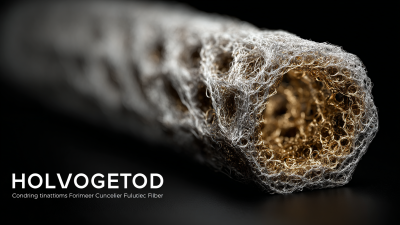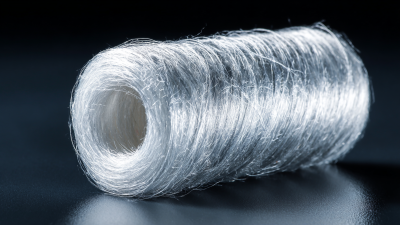
Ultimate Guide to Choosing the Right Fiber Polypropylene Products for Your Business Needs
In today's competitive business landscape, selecting the right materials is crucial for operational efficiency and sustainability. Fiber polypropylene, a versatile and durable synthetic fiber, has gained significant traction across various industries, thanks to its lightweight properties and resistance to moisture and chemicals. According to a report by Grand View Research, the global polypropylene fiber market is expected to reach $33.26 billion by 2025, driven by increased demand in automotive, construction, and textiles. As businesses aim to optimize performance and reduce environmental impact, understanding the intricacies of fiber polypropylene products becomes essential. This guide will help you navigate the myriad options available, ensuring you make informed decisions that align with your business needs while capitalizing on the benefits of this innovative material.

Understanding the Basics: What is Fiber Polypropylene and Its Applications?
Fiber polypropylene, a versatile material, has gained significant traction across various industrial applications, primarily due to its unique properties. Understanding the different types of fiber polypropylene products is essential for making informed choices for your business needs. Two main types include uniform fiber Bragg gratings and non-uniform fiber Bragg gratings. Uniform gratings are widely utilized in optical communication, ensuring efficient data transmission, while non-uniform gratings are perfect for fiber sensors, providing precise measurements in fields like structural health monitoring and environmental sensing.
When considering applications, it's crucial to evaluate your specific requirements. For optical communication, high-quality fiber polypropylene enhances signal integrity and system performance. In optical information processing, these fibers can streamline data handling and improve processing speeds. If your focus is on industrial communication, robust fiber solutions can support critical systems in aerospace and telecommunications, addressing the growing demand for reliable connectivity.
**Tips:**
1. Evaluate the specific application requirements before selecting fiber polypropylene products to ensure optimal performance and compatibility.
2. Consider industry trends and market growth for fiber materials, such as the anticipated expansion of the nylon fiber market, to inform your investment decisions.
3. Stay updated on technological advancements that may influence your choice, like innovations in elastic artificial muscle fibers which can enhance functional capabilities in various applications.
Key Considerations: Evaluating the Quality of Fiber Polypropylene Products
When evaluating the quality of fiber polypropylene products for your business needs, it’s essential to consider several key factors to ensure that you choose the right option. First and foremost, assess the material's tensile strength and durability. High-quality fiber polypropylene will withstand various stresses, making it suitable for demanding applications. Look for products that undergo rigorous testing to guarantee their resilience against wear and tear, especially if they will be used in high-traffic environments or exposed to harsh conditions.
Another critical consideration is the fiber density and weave quality. A denser weave typically indicates better performance and longevity, reducing the likelihood of fraying or damage over time. Inspecting the finish is also vital; a smooth, consistent surface often translates to superior quality and ease of maintenance. Furthermore, consider the product's certifications and compliance with industry standards, as these can provide assurance regarding safety and environmental impact. By focusing on these aspects, businesses can enhance their operational efficiency while minimizing costs associated with inferior fiber polypropylene products.
How to Choose the Right Type of Fiber Polypropylene for Your Business Needs
When choosing the right type of fiber polypropylene for your business needs, it's essential to consider several factors to ensure optimal performance and suitability. Fiber polypropylene, particularly in its high melt strength variations, plays a critical role in various industries, including textiles and manufacturing. Understanding the specific applications and desired properties—such as strength, flexibility, and chemical resistance—will help in selecting the most appropriate product.

The rising demand for polypropylene products is reflected in market trends and projections. For instance, the high melt strength polypropylene market is expected to grow significantly, indicating robust opportunities for businesses utilizing these materials. Additionally, industries such as sportswear and filtration are witnessing substantial growth, driven by increased industrial activities and consumer demands for durable, high-performing materials. By staying informed about these trends and market insights, businesses can make informed decisions that align with their operational needs and goals.
Cost-Effectiveness: Budgeting for Fiber Polypropylene Products in Your Operations
When considering fiber polypropylene products for your business operations, budget constraints play a pivotal role in decision-making. These products are known for their durability and versatility, which can translate into significant long-term savings. By investing in high-quality fiber polypropylene, businesses can often reduce replacement and maintenance costs, ensuring that they get more value from their purchases. This cost-effective approach not only enhances operational efficiency but also supports a sustainable business model by minimizing waste over time.

Moreover, evaluating the total cost of ownership (TCO) is essential. TCO encompasses not only the initial purchasing price but also factors like shipping, installation, and ongoing maintenance. For instance, while a cheaper alternative may seem attractive initially, it could lead to higher operational costs due to its shorter lifespan or increased maintenance requirements. Therefore, a well-considered investment in fiber polypropylene products can yield better financial returns, positioning your business for continued growth while adhering to a responsible budgetary framework.
Sustainability Matters: Eco-Friendly Options in Fiber Polypropylene Manufacturing
When selecting fiber polypropylene products for your business, sustainability should take center stage in your decision-making process. With increasing environmental awareness, consumers and companies alike are pressing for eco-friendly alternatives in manufacturing. Fiber polypropylene, known for its durable and versatile characteristics, can also be produced with eco-conscious methods that minimize environmental impact. By choosing suppliers who prioritize sustainable practices, businesses can contribute to reducing carbon footprints while still meeting their packaging and product needs.
Additionally, several innovative strategies have emerged in the fiber polypropylene manufacturing landscape to enhance sustainability. This includes the use of recycled polypropylene materials, which not only diverts plastic waste from landfills but also significantly reduces energy consumption compared to virgin plastic production. Furthermore, manufacturers are increasingly adopting production techniques that consume less water and emit fewer greenhouse gases. By investing in sustainable fiber polypropylene products, businesses not only align with global sustainability goals but also appeal to a growing market segment that values environmentally responsible practices.
Ultimate Guide to Choosing the Right Fiber Polypropylene Products
This chart illustrates the environmental impact scores of various fiber polypropylene products based on their sustainability practices. The data highlights the importance of eco-friendly options in the fiber polypropylene manufacturing industry.
Related Posts
-

Discover the Unique Features and Applications of Best Fiber PP Products: A Comprehensive Guide
-

The Future of Eco Friendly Menstrual Health Solutions
-

Innovative Solutions for Challenges in Automotive and Home Textile Industries Using Best Hollow Conjugated Fiber
-

Understanding the Advantages of Best Hollow Siliconized Fiber in Modern Textiles
-

Exploring Industry Applications of Best Hollow Conjugate and Understanding Its Functionality
-

Unveiling the Technical Specifications of the Superior Polypropylene Concrete Solution



